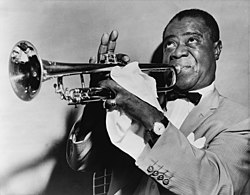Cards In This Set
| Front | Back |
|
Buddy Bolden
|
 A key figure in the development of a New Orleans style of rag-time music which later came to be known as jazz. He is credited with creating a looser, more improvised version of ragtime and adding blues to it; Bolden's band was said to be the first to have brass instruments play the blues. He was also said to have taken ideas from gospel music. The first jazz celebrity. |
|
King Oliver
|
 A jazz cornet player and bandleader. He was particularly noted for his playing style, pioneering the use of mutes. He was the mentor and teacher of Louis Armstrong. He credited Buddy Bolden as an early influence. |
|
Jellyroll Morton
|
 An American ragtime and early jazz pianist, bandleader and composer. Perhaps most notable as jazz's first arranger, proving that a genre rooted in improvisation could retain its essential spirit and characteristics when notated. Reputed for his arrogance and self-promotion as often as recognized in his day for his musical talents, he claimed to have invented jazz outright in 1902. |
|
Fletcher Henderson
|
 An American pianist, bandleader, arranger andcomposer, important in the development of big band jazz and swing music. His was one of the most prolific black orchestras and his influence was vast.He established the formula for swing music |
|
Louis Armstrong
|
 An American jazz trumpeter and singer from New Orleans, Louisiana. A foundational influence in jazz, shifting the music's focus from collective improvisation to solo performance. Renowned for his charismatic stage presence and voice almost as much as for his trumpet-playing, He consolidated all aspects of jazz. |
|
Bix Beiderbecke
|
 Was one of the most influential jazz soloists of the 1920s. His turns on "Singin' the Blues" (1927) and "I'm Coming, Virginia" (1927), in particular, demonstrated an unusual purity of tone and a gift for improvisation. With these two recordings, especially, he helped to invent the jazz ballad style and hinted at what, in the 1950s, would become cool jazz. "In a Mist" (1927), one of a handful of his piano compositions but the only one he recorded, mixed classical influences with jazz syncopation. |
|
Duke Ellington
|
 An American composer, pianist, and big band leader, he wrote over 1,000 compositions."In the century since his birth, there has been no greater composer, American or otherwise..." |
|
Count Basie
|
 An American jazz pianist, organist, bandleader, and composer. He led his jazz orchestra almost continuously for nearly 50 years. Many notable musicians came to prominence under his direction, including tenor saxophonists Lester Young and Herschel Evans, trumpeters Buck Clayton and Harry "Sweets" Edison and singers Jimmy Rushing and Joe Williams.His theme songs were "One O'Clock Jump" and "April In Paris". |
|
The Four Components of Music
|
Rhythm
melody lyrics chords |
|
How is time divided in music?
|
Beats
Uneven beats= Swing |
|
How many notes to make a chord?
|
3
|
|
Syncopation
|
Disturbance or interruption of the regular flow of rhythm; a placement of
rhythmic stresses or accents where they wouldn't normally occur.
|
|
Polyrythm
|
The simultaneous sounding of two or more independent rhythms.
|
|
Griot
|
Story teller and repository in African tribes.
|
|
Psalmody
|
Call and response music sang in a church. It uses a basic tune that everyone knows so that people can join in. 1st style of jazz.
|



